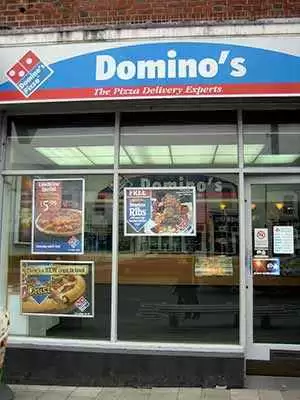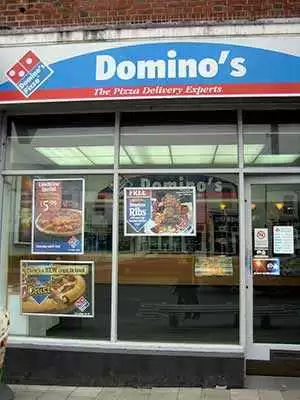
I have a big issue with what I believe to be a misleading headline in a recent joint press release by Domino's Pizza and the National Foundation for Celiac Awareness (NFCA)...here is the headline:
"Domino’s Pizza Becomes First National Pizza Delivery Chain to Offer Gluten Free Crust"
Celiac.com Sponsor (A12):
 When you read the release further, starting at the 5th paragraph, which many people will never get to, it says:
When you read the release further, starting at the 5th paragraph, which many people will never get to, it says:
"While Domino’s new Gluten Free Crust is appropriate for those with mild gluten sensitivity, Domino’s and the NFCA do not recommend it for those with celiac disease. Domino’s and the NFCA found that while the crust is certified as gluten free, current store operations at Domino’s cannot guarantee that each handcrafted pizza will be completely free from gluten."
So my question is this: How can the NFCA, a national organization dedicated to supporting celiacs, actually get behind this? Domino's is obviously a big corporation that has decided it wants to cash in and profit on the new gluten-free gold rush, but they cleary don't want to spend the money that it would take to make their pizzas truely gluten-free, and safe for celiacs.
The Designations area of Open Original Shared Link begins with: "Restaurants that complete GREAT Kitchens earn a designation based on their ability to meet gluten-free needs and avoid cross-contamination with gluten." Just below this it describes their "Green Designation" and its "Amber Designation," and describes its Amber Designation as follows: "This level requires ingredient verification and basic training of wait staff and managers. Kitchen practices may vary with this designation, level one of the tier system, meaning those with celiac disease and non-celiac gluten sensitivity should ask questions and exercise judgment when dining at an establishment with an Amber Designation. Domino's has earned this designation." So how has Domino's met "gluten-free needs and avoid cross-contamination with gluten"?
Also, I think any celiac who Open Original Shared Link will find it a bit scary...the same ovens, pizza scoopers, topping areas, etc., as where they make their regular gluten pizzas.
I would exclude Domino's as an advertiser on Celiac.com based on this release.
Some might think that the NFCA has sold out here. I invite them to respond using the comment field below, and I invite you to respond.
- Open Original Shared Link.
Here is the original press release:
ANN ARBOR, Mich., May 7, 2012 – Domino's Pizza is responding to the needs of choice consumers, today launching a Gluten Free Crust available in all of its nearly 5,000 U.S. stores and becoming the first national pizza delivery chain to offer such a product.
Domino’s Pizza (NYSE: DPZ) consulted with the National Foundation for Celiac Awareness (NFCA) to ensure its products and team member training meet the standards of the foundation’s GREAT Kitchens Amber Designation. NFCA’s GREAT Kitchens is an official credentialing program that has expanded to include restaurants offering gluten free products with varying kitchen practices, therefore suitable for those with gluten sensitivity under the Amber Designation.
Domino’s new Gluten Free Crust provides a great-tasting option for consumers who previously could not enjoy pizza from the recognized world leader in pizza delivery because of sensitivity to gluten – a protein found in wheat, rye and barley.
“Many of our customers have asked for a gluten free crust, and Domino’s is excited to offer a product to customers with mild gluten sensitivity – as well as partner with the NFCA, which has been instrumental to our learning more about how to take this step,” said J. Patrick Doyle, Domino’s Pizza president and CEO. “The prevalence of gluten sensitivity has become a real issue with significant impact on consumer choice, and we want to be a part of the solution. Now, the whole group can enjoy Domino’s with the addition of our new Gluten Free Crust.”
While Domino’s new Gluten Free Crust is appropriate for those with mild gluten sensitivity, Domino’s and the NFCA do not recommend it for those with celiac disease. Domino’s and the NFCA found that while the crust is certified as gluten free, current store operations at Domino’s cannot guarantee that each handcrafted pizza will be completely free from gluten.
“The NFCA is thrilled that Domino’s Pizza has developed a product that will improve the quality of life for many of the estimated 18 million Americans who are gluten sensitive,” said Alice Bast, NFCA founder and president. “Not only is Domino’s Gluten Free Crust a huge win for much of the gluten free community who can now get pizza delivered to their door, it’s also delicious. Customers aren’t going to believe they’re eating a pizza made on a gluten free crust when they try it. And the variety of fresh toppings that are available is a giant leap ahead.”
In an effort to remain open and informative about Domino’s Gluten Free Crust, Domino’s has created a video on YouTube that allows customers to decide whether this product is suitable for their diet, found here: Open Original Shared Link.
“Offering Domino’s Gluten Free Crust is a big step for us, and we wanted to make sure we were doing it right,” said Doyle. “Domino’s is doing that by partnering with experts at the NFCA and by empowering the gluten sensitive community with the information they need.”
Domino’s new Gluten Free Crust is available in stores across the U.S. in a small, 10-inch size only, and prices vary by store.
Domino’s pizza made with a Gluten Free Crust is prepared in a common kitchen with the risk of gluten exposure. The National Foundation for Celiac Awareness supports the availability of Domino’s Gluten Free Crust, but cannot recommend the pizza for customers with celiac disease. Customers with gluten sensitivities should exercise judgment in consuming this pizza.
About Domino’s Pizza®
Founded in 1960, Domino's Pizza is the recognized world leader in pizza delivery. Domino’s is listed on the NYSE under the symbol “DPZ.” As of the first quarter of 2012, through its global footprint primarily made up of locally-owned and operated franchises, Domino’s operated a network of 9,810 franchised and Company-owned stores in the United States and over 70 international markets. During the first quarter of 2012, Domino’s had global retail sales of nearly $1.7 billion, comprised of over $830 million domestically and nearly $855 million internationally. Domino's Pizza had global retail sales of over $6.9 billion in 2011, comprised of over $3.4 billion domestically and over $3.5 billion internationally. In May 2011, Pizza Today named Domino’s its “Chain of the Year” for the second straight year – making the company a three-time overall winner, and the first pizza delivery company to receive the honor in back-to-back years. In 2011, Domino’s was ranked #1 in Forbes Magazine’s “Top 20 Franchises for the Money” list.




.webp.e39faec2bae44ea86d1ef2c2bf8eb537.webp)


.webp.c9c1225f70aa2135181939974293cba3.webp)


Recommended Comments